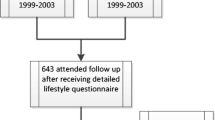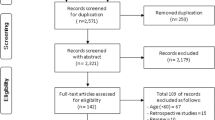Abstract
Summary
A frailty concept that includes psychological and cognitive markers was prospectively shown to be associated with increased risk of multiple falls and fractures among 1,509 community dwelling older adults, especially in those aged 75 and over. The predictive ability of frailty is not superior to falls history.
Introduction
The concept of frailty has been defined with or without psychological and cognitive markers. Falls are associated with multiple risk factors, including cognitive and mood disorders. The purpose of this study was to investigate the association of a comprehensive concept of frailty and its components with falls and fractures in community-dwelling older adults and to compare its predictive ability with having a history of falls.
Methods
One thousand five hundred nine participants in the Longitudinal Aging Study Amsterdam aged ≥65 were assessed to determine fall history and the prevalence of nine frailty markers, including cognitive and psychological factors. The number of falls and time to second fall were prospectively registered for 1 year. Fractures were registered for 6 years.
Results
Frailty was significantly associated with time to second fall: hazard ratio of 1.53 [95 % confidence interval (CI), 1.07–2.18] and area under the receiver operating characteristic curve (AUC) of 0.58 (CI, 0.53–0.62). In participants aged ≥75, frailty was associated with ≥2 falls: odds ratio (OR) of 1.74 (CI, 1.19–2.55) and AUC of 0.62 (CI, 0.55–0.68). Frailty, adjusted for age and sex, was significantly associated with ≥2 fractures: OR of 3.67 (CI, 1.47–9.15). The AUCs for falls history (aged ≥75) ranged from 0.62 (CI, 0.58–0.67) for ≥1 falls to 0.67 (CI, 0.59–0.74) for ≥3 falls.
Conclusions
A concept of frailty including psychological and cognitive markers is associated with both multiple falls and fractures. However, frailty is not superior to falls history for the selection of old persons at increased risk of recurrent falls.
Similar content being viewed by others
Abbreviations
- HR:
-
Hazard ratio
- OR:
-
Odds ratio
- AUC:
-
Area under the receiver operating characteristic curve
- CI:
-
95 % confidence interval
References
Fried LP, Tangen CM, Walston J, Newman AB, Hirsch C, Gottdiener J, Seeman T, Tracy R, Kop WJ, Burke G, McBurnie MA (2001) Frailty in older adults: evidence for a phenotype. J Gerontol A Biol Sci Med Sci 56:M146–M156
Morley JE, Perry HM III, Miller DK (2002) Editorial: something about frailty. J Gerontol A Biol Sci Med Sci 57:M698–M704
Puts MT, Lips P, Deeg DJ (2005) Static and dynamic measures of frailty predicted decline in performance-based and self-reported physical functioning. J Clin Epidemiol 58:1188–1198
Nevitt MC, Cummings SR, Kidd S, Black D (1989) Risk factors for recurrent nonsyncopal falls. A prospective study. JAMA 261:2663–2668
Nevitt MC, Cummings SR, Hudes ES (1991) Risk factors for injurious falls: a prospective study. J Gerontol 46:M164–M170
Stalenhoef PA, Diederiks JP, Knottnerus JA, Kester AD, Crebolder HF (2002) A risk model for the prediction of recurrent falls in community-dwelling elderly: a prospective cohort study. J Clin Epidemiol 55:1088–1094
Tromp AM, Smit JH, Deeg DJ, Bouter LM, Lips P (1998) Predictors for falls and fractures in the longitudinal aging study Amsterdam. J Bone Miner Res 13:1932–1939
Tromp AM, Ooms ME, Popp-Snijders C, Roos JC, Lips P (2000) Predictors of fractures in elderly women. Osteoporos Int 11:134–140
Pluijm SM, Smit JH, Tromp EA, Stel VS, Deeg DJ, Bouter LM, Lips P (2006) A risk profile for identifying community-dwelling elderly with a high risk of recurrent falling: results of a 3-year prospective study. Osteoporos Int 17:417–425
Ensrud KE, Ewing SK, Taylor BC, Fink HA, Cawthon PM, Stone KL, Hillier TA, Cauley JA, Hochberg MC, Rodondi N, Tracy JK, Cummings SR (2008) Comparison of 2 frailty indexes for prediction of falls, disability, fractures, and death in older women. Arch Intern Med 168:382–389
Romero-Ortuno R, Cogan L, Foran T, Kenny RA, Fan CW (2011) Continuous non-invasive orthostatic blood pressure measurements and their relationship with orthostatic intolerance, falls, and frailty in older people. J Am Geriatr Soc 59:655–665
Wolf SL, Barnhart HX, Kutner NG, McNeely E, Coogler C, Xu T (1996) Reducing frailty and falls in older persons: an investigation of Tai Chi and computerized balance training. Atlanta FICSIT group. Frailty and injuries: cooperative studies of intervention techniques. J Am Geriatr Soc 44:489–497
Huisman M, Poppelaars J, van der Horst M, Beekman A, Brug J, van Tilburg T, Deeg D (2011) Cohort profile: the longitudinal aging study Amsterdam. Int J Epidemiol 40:868–876
Deeg DJ, van Tilburg T, Smit JH, de Leeuw ED (2002) Attrition in the longitudinal aging study Amsterdam. The effect of differential inclusion in side studies. J Clin Epidemiol 55:319–328
Cook NR, Albert MS, Berkman LF, Blazer D, Taylor JO, Hennekens CH (1995) Interrelationships of peak expiratory flow rate with physical and cognitive function in the elderly: MacArthur Foundation studies of aging. J Gerontol A Biol Sci Med Sci 50:M317–M323
Folstein MF, Folstein SE, McHugh PR (1975) Mini-mental state. A practical method for grading the cognitive state of patients for the clinician. J Psychiatr Res 12:189–198
Pearlin LI, Schooler C (1978) The structure of coping. J Health Soc Behav 19:2–21
Radloff LS, Teri L (1986) Use of the center for epidemiological studies-depression scale with older adults. Clinical Gerontology 5:119–136
Stel VS, Smit JH, Pluijm SM, Visser M, Deeg DJ, Lips P (2004) Comparison of the LASA physical activity questionnaire with a 7-day diary and pedometer. J Clin Epidemiol 57:252–258
Stel VS, Pluijm SM, Deeg DJ, Smit JH, Bouter LM, Lips P (2003) A classification tree for predicting recurrent falling in community-dwelling older persons. J Am Geriatr Soc 51:1356–1364
Kellogg International Work Group on the Prevention of Falls by the Elderly (1987) The prevention of falls in later life. Dan Med Bull 34(4):1–24
Kriegsman DM, Penninx BW, van Eijk JT, Boeke AJ, Deeg DJ (1996) Self-reports and general practitioner information on the presence of chronic diseases in community dwelling elderly. A study on the accuracy of patients' self-reports and on determinants of inaccuracy. J Clin Epidemiol 49:1407–1417
Oksanen T, Kivimaki M, Pentti J, Virtanen M, Klaukka T, Vahtera J (2010) Self-report as an indicator of incident disease. Ann Epidemiol 20:547–554
Ensrud KE, Ewing SK, Taylor BC, Fink HA, Stone KL, Cauley JA, Tracy JK, Hochberg MC, Rodondi N, Cawthon PM (2007) Frailty and risk of falls, fracture, and mortality in older women: the study of osteoporotic fractures. J Gerontol A Biol Sci Med Sci 62:744–751
Ensrud KE, Ewing SK, Cawthon PM, Fink HA, Taylor BC, Cauley JA, Dam TT, Marshall LM, Orwoll ES, Cummings SR (2009) A comparison of frailty indexes for the prediction of falls, disability, fractures, and mortality in older men. J Am Geriatr Soc 57:492–498
Avila-Funes JA, Amieva H, Barberger-Gateau P, Le GM, Raoux N, Ritchie K, Carriere I, Tavernier B, Tzourio C, Gutierrez-Robledo LM, Dartigues JF (2009) Cognitive impairment improves the predictive validity of the phenotype of frailty for adverse health outcomes: the three-city study. J Am Geriatr Soc 57:453–461
Eggermont LH, Penninx BW, Jones RN, Leveille SG (2012) Depressive symptoms, chronic pain, and falls in older community-dwelling adults: the Mobilize Boston Study. J Am Geriatr Soc 60:230–237
Muir SW, Gopaul K, Montero Odasso MM (2012) The role of cognitive impairment in fall risk among older adults: a systematic review and meta-analysis. Age Ageing 41(3):299–308
Yamashita T, Jeon H, Bailer AJ, Nelson IM, Mehdizadeh S (2011) Fall risk factors in community-dwelling elderly who receive Medicaid-supported home- and community-based care services. J Aging Health 23:682–703
de Vries OJ, Peeters GM, Elders PJ, Muller M, Knol DL, Danner SA, Bouter LM, Lips P (2010) Multifactorial intervention to reduce falls in older people at high risk of recurrent falls: a randomized controlled trial. Arch Intern Med 170:1110–1117
Gerdhem P, Ringsberg KA, Magnusson H, Obrant KJ, Akesson K (2003) Bone mass cannot be predicted by estimations of frailty in elderly ambulatory women. Gerontology 49:168–172
Gerdhem P, Ringsberg K, Akesson K, Obrant KJ (2004) Just one look, and fractures and death can be predicted in elderly ambulatory women. Gerontology 50:309–314
de Vries NM, Staal JB, van Ravensberg CD, Hobbelen JS, Olde Rikkert MG, Nijhuis-van der Sanden MW (2011) Outcome instruments to measure frailty: a systematic review. Ageing Res Rev 10:104–114
Conflicts of interest
None.
Author information
Authors and Affiliations
Corresponding author
Rights and permissions
About this article
Cite this article
de Vries, O.J., Peeters, G.M.E.E., Lips, P. et al. Does frailty predict increased risk of falls and fractures? A prospective population-based study. Osteoporos Int 24, 2397–2403 (2013). https://doi.org/10.1007/s00198-013-2303-z
Received:
Accepted:
Published:
Issue Date:
DOI: https://doi.org/10.1007/s00198-013-2303-z




